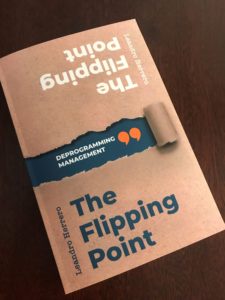In my dealings with organizations of many sizes and shapes, cultures and geographies, I always find very fine individuals of healthy intellect, with good hearts, committed to the firm, with a wealth of experience, sharp views of the environment and sound professionals in their fields of expertise.
Why is it that those individualities, when aggregated in a ‘structure’ such as a Division, functional group, business unit, Committee on Something, seem to shrink and, suddenly, those little or not so little innovation engines (excuse my language) seem to be swallowed up in a sea of platitudes, terrible critical thinking and idea recycling, politically correct statements of intention, and trips in the road to nowhere? How come?
The logical expectation, I would have thought, is that the aggregation is bigger than the parts, that the collective wisdom is the fruit of those contributions, that velocity is injected and good stuff happens, thanks to all those healthy intellects, good hearts, commitments, wealth of experiences, and sharp views of the environment, now having a common home.
But, why is it that the home sometimes feels like a corset two sizes smaller, a straitjacket coming from nowhere, a babble of unintelligible jargon, a contest to make the point, a game to score in some undefined ranking, and, in general, a bad sum, a 3 + 4 = 2, a terrible intellectual deal, a circular system of recycled ideas, a sort of gigantic hamster wheel for managers?
Drucker’s famous definition of the company as ‘ordinary people doing extraordinary things together’, feels to me sometimes like extraordinary people doing ordinary things, and not much together.
Bad sum.
Something in the system that is created for collective action seems to have too many breaks, too many gates, too many translators, too many safeguards, too much political correctness, too much fear, too much checking upwards, sideways and down, like constant security checks in airports with many terminals, too much just in case, too much ‘in my opinion’, too much ‘the problem is’, a low heat cooking that never quite boils, a sailing boat stuck in the dock, a juxtaposition of opinions that run vocally in parallel, never quite meeting, a Ferrari that runs in low gear, if it runs at all, because most of the time it feels like admiring the Ferrari.
And it sucks.
If the collective is worse than the sum of the individuals, we would be better off having a General with an army of secret advisers managed by a clever algorithm. What is the point of having not only teams, no, high performance teams, and committees, and boards, that run collectively at a lower voltage than when the components are left loose?
This is a grim picture, reality is not like that, some would say, but I disagree. The role of the leader surely is not to cook a meal of platitudes but to come up with something new and transforming. Most of the ‘this was a good meeting’ meetings are long psychotherapy sessions. There is not enough restlessness and agony. Yes, the suffering meaning of agony is only 17th Century. Before, it was Greek for contest.
Where is the contest, sometimes I ask myself. I see a lot of content, and a lot of content (pleased) people with a lower common denominator achievement (intellectually, operationally) than the one you could have predicted from knowing them individually.
Sometimes the collective feels like a bad deal, a bad sum. And those kind of days send me to a retreat, greatly facilitated by a double malt.
________________________________________________________________________________________________
Continue the conversation….
Learn how to successfully mobilize your people!
Do you want to learn how to successfully mobilize your people for a purpose and change culture? Culture is the key to the complex post Covid-19 future in front of us. Join us on 16th July, 18:00 BST/19:00 CET for our free webinar on The Myths of Company Culture [1].
Stuck in old concepts, we have made culture change hard and often impossible. The failure of communication programmes or ‘culture training’ tell us a lot about the myths in this area. Learn how to successfully mobilize your people for a purpose and change culture. Culture is the key to the complex post Covid-19 future in front of us. Over the Covid-19 peak across the world we have seen the best and the worst of company cultures. Sometimes it felt like a pressure cooker. Culture is now ‘the strategy’, but we need to get rid of some assumptions and learn inconvenient truths.
Register Now! [1]

Each participant who attends any of the live webinars of the Feed Forward series will be eligible for one copy of The Flipping Point [2].

____________________________________________________________________________________________
Contact us [3] to find out more about engaging Dr Leandro Herrero for speaking opportunities [3] with your company.